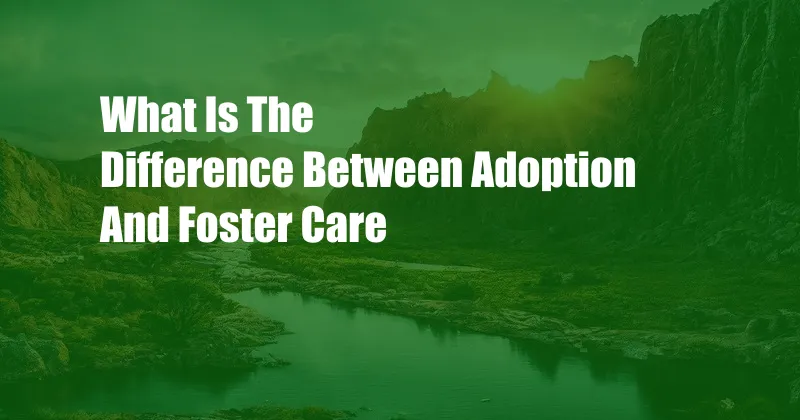
The Difference Between Adoption and Foster Care
Adoption is the legal process of establishing a permanent parent-child relationship between a child and an adult or couple. It transfers the child’s custody from their biological parents or previous guardians to the adoptive family.
Foster care, on the other hand, is a temporary arrangement in which a child is placed in the care of a state-licensed foster home or family. The child’s biological parents or legal guardians retain custody of the child, while the foster family provides a safe and supportive environment.
The History and Meaning of Adoption
Adoption has been practiced for centuries, with records dating back to ancient times. In the past, adoption was often used to secure an heir or to provide a home for an orphaned or abandoned child. In the modern era, adoption is primarily used to create stable and permanent family relationships for children in need.
The meaning of adoption has also evolved over time. In the past, it was seen as a way to replace a child’s biological parents. Today, it is increasingly recognized that adoption creates a “blended” family, where the child maintains a connection to both their biological and adoptive families.
Foster Care: A Temporary Solution
Foster care is a temporary arrangement that is typically used when a child cannot safely remain with their biological parents. The goal of foster care is to provide the child with a safe and supportive environment while their family works towards reunification. Many factors can necessitate foster care, such as:
- Neglect or abuse
- Mental illness or substance abuse
- Domestic violence
While foster care is intended to be temporary, the average length of placement is 22 months. This can have a significant impact on the child’s development, educational progress, and overall well-being.
Adoption vs. Foster Care: Key Differences
While adoption and foster care both involve placing a child in a new home, there are several key differences between the two arrangements:
- Legal Status: Adoption creates a permanent legal relationship between the child and the adoptive family. Foster care, on the other hand, is a temporary arrangement that does not terminate the legal relationship between the child and their biological parents.
- Length of Placement: Adoption is intended to be permanent. Foster care is typically temporary, with the goal of reunifying the child with their biological family.
- Parental Rights: Upon adoption, the adoptive parents assume all parental rights and responsibilities for the child. In foster care, the biological parents retain custody of the child, and the foster family assumes temporary parental responsibilities.
The Latest Trends in Adoption and Foster Care
One of the most significant trends in adoption and foster care is the increasing number of older children and sibling groups being placed. This is due in part to the opioid crisis and other factors that have led to a rise in the number of children being removed from their homes.
Another trend is the growing use of technology in adoption and foster care. Many agencies are now using online platforms to match children with potential adoptive or foster families. This can help to reduce the time children spend in care and ensure they are placed in a stable and loving home.
Tips and Expert Advice for Understanding Adoption and Foster Care
If you are considering adoption or foster care, there are several things you should keep in mind:
- Do your research: Learn as much as you can about adoption and foster care. Talk to adoptive and foster parents, social workers, and other professionals. Attend workshops and seminars.
- Be honest with yourself: Adoption and foster care can be challenging. Be honest with yourself about your motivations, expectations, and ability to provide a stable and loving home for a child.
- Work with a qualified agency: Choose a reputable adoption or foster care agency that can provide you with the support and services you need.
- Be patient: The adoption or foster care process can take time. Be patient and persistent, and don’t give up on your dream of becoming a parent.
If you are committed to providing a loving and stable home for a child, adoption or foster care could be the right path for you. By educating yourself and working with a qualified agency, you can increase your chances of a successful outcome.
FAQ on Adoption and Foster Care
Q: What are the eligibility requirements for adoption?
A: Eligibility requirements for adoption vary from state to state. However, most states require adoptive parents to be at least 18 years old, have a stable income, and have a clean criminal record.
Q: How do I become a foster parent?
A: To become a foster parent, you must contact your local foster care agency. You will be required to undergo a home study and criminal background check. You will also need to complete a training program.
Q: What is the difference between adoption and guardianship?
A: Adoption is a permanent legal relationship. Guardianship is a temporary arrangement in which a child is placed in the care of an adult who is not their biological parent. The guardian assumes temporary parental responsibilities for the child but does not have the same legal rights and responsibilities as an adoptive parent.
Conclusion
Adoption and foster care are both important ways to provide a stable and loving home for a child. While there are some key differences between the two arrangements, both adoption and foster care can be a rewarding experience for both the child and the family.
If you are considering adoption or foster care, we encourage you to do your research and work with a qualified agency. With the right preparation and support, you can create a lasting and loving family for a child in need.
Are you interested in learning more about adoption or foster care? Please visit our website or contact us for more information.